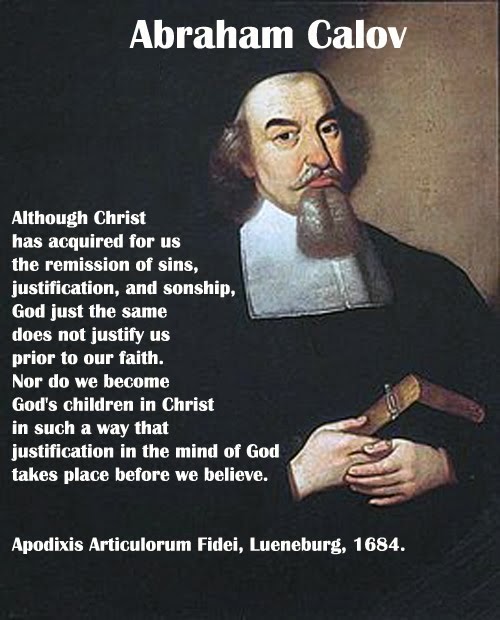 |
| As quoted in Justification and Rome, edited by the Preus Brothers but repudiated or ignored or denied. |
5. You see therefore that this example of the leper fights for faith and against works. For as Christ helps him out of pure grace through faith without any works or merits of his own, so he does for every man, and would have all to think thus of him and expect from him like aid. And if this leper had said: “Behold, Lord, I have prayed and fasted so much; I beg you to look upon this and on account of it make me clean” – if he had come in this manner, Christ would never have cleansed him. For such a person does not rest upon God’s grace, but upon his own merit. In this way God’s grace is not praised, loved, magnified nor desired; but one’s own works deprive God of his honor and rob him of that which is his. This is to kiss the hand and to deny God, as Job 31:27-28 says: “If my mouth hath kissed my hand; this also were an iniquity to be punished by the judges; for I should have denied God that is above;” and Isaiah 2:8: “They worship the work of their own hands,” that is, the honor and confidence they ought to give to God, they attribute to their own work.
6. Furthermore the example of love is presented here in the love of Christ to the leper. For you see here, how love makes a servant of Christ, so that he helps the poor man freely without any reward, and seeks neither advantage, favor nor honor thereby, but only the good of the poor man and the honor of God the Father. For this reason he also forbids him to tell anyone, in order that it may be a pure, sincere work of free and gracious love.
7. This is what I have often said, that faith makes of us lords, and love makes of us servants,. Indeed, by faith we become gods and partakers of the divine nature and name, as is said in Psalm 82:6: “I said, Ye are gods, and all of you sons of the Most High.” But through love we become equal to the poorest. According to faith we are in need of nothing, and have an abundance; according to love we are servants of all. By faith we receive blessings from above, from God; through love we give them out below, to our neighbor. Even as Christ in his divinity stood in need of nothing, but in his humanity served everybody who had need of him. Of this we have spoken often enough, namely, that we also must by faith be born God’s sons and gods, lords and kings, even as Christ is born true God of the Father in eternity; and again, come out of ourselves by love and help our neighbors with kind deeds, even as Christ became man to help us all.
And as Christ is not God, because he first merited divinity by his works or attained to it through his incarnation, but has it by birth, without any works, even before he became man; so we also have not merited by works or love sonship with God, so that our sins are forgiven, and death and hell cannot injure us; but without works and before our love, we have received it in the Gospel by grace through faith. And as Christ first became man to serve us after being God from eternity; so we also do good and exercise love to our neighbor, after we have become pious, free from sin, alive, saved, and sons of God by faith. Let this suffice concerning the first example, the leper.
8. The other example is like it in respect to faith and love. For this centurion also has a heartfelt confidence in Christ, and sets before his eyes nothing but the goodness and grace of Christ; otherwise he would not have come to him, or he would not have sent to him, as Luke 7:3 says.
Likewise he would not have had this bold confidence, if he had not first heard of the goodness and grace of Christ. In this instance also the Gospel is the beginning and incentive of his confidence and faith.
9. Here we learn again, that we must begin with the Gospel and believe it and not look upon any merit or work of our own as this centurion also advanced no merit or work, but only his confidence in the goodness of Christ. So we see that all the works of Christ exhibit examples of the Gospel, of faith and of love.
10. We also observe the example of love, how Christ freely shows him kindness, without any request or reward, as was said above. Moreover, the centurion also shows an example of love, in that he took pity upon his servant as upon himself, even as Christ also has had compassion upon us, and did the good deed freely, solely for the benefit of the servant, as Luke 7:2 says, he did it because the servant was dear to him; just as if he said: The love and affection, which he bore to him, impelled him to consider his need and to do this. Let us also do likewise, and see to it that we do not deceive ourselves and rest satisfied in that we now have the Gospel, and yet have no regard for our neighbor in his need. This having been said of these two examples, we will now also examine some details of the text.

